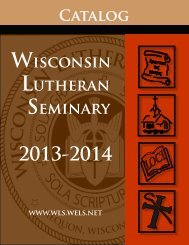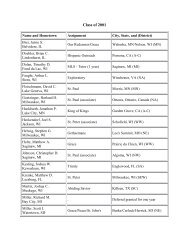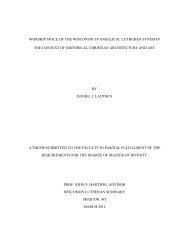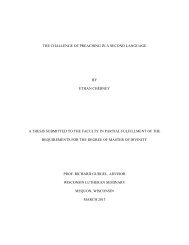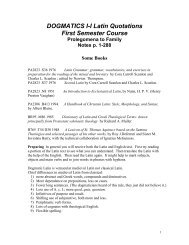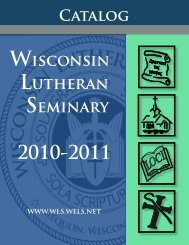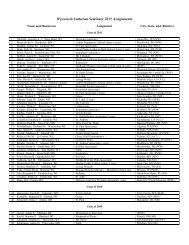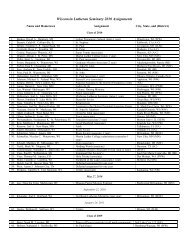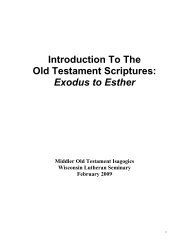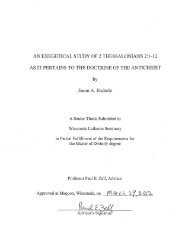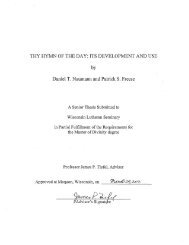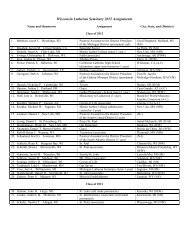Untitled - Wisconsin Lutheran Seminary - WELS
Untitled - Wisconsin Lutheran Seminary - WELS
Untitled - Wisconsin Lutheran Seminary - WELS
You also want an ePaper? Increase the reach of your titles
YUMPU automatically turns print PDFs into web optimized ePapers that Google loves.
Unlike God’s plan of salvation which is based on the truth of God’s grace, the mission of<br />
the “lawless one” is to mislead. As if to rule out any other possibility Paul adds the phrase ἐν<br />
πάσῃ ἀπάτῃ ἀδικίας (“with every deception of wickedness”) to his list of deceitful powers given<br />
to the Antichrist by Satan. Martin writes:<br />
The message of the lawless one springs not from truth or even from honest error but<br />
from a satanic and conscious intent to mislead. It is self-consciously contrary to God’s<br />
truth and will find its greatest audience among persons already hostile to God’s truth, that<br />
is, among “those who are perishing.” 97<br />
They are perishing<br />
With the dative τοῖς ἀπολλυμένοις (“to those who are perishing”) Paul indicates the fate of<br />
those who believe in such false deeds. τοῖς ἀπολλυμένοις is an articularized present middle<br />
participle in the dative case from the root ἀπόλλυμαι. This word indicates eternal ruin. Paul<br />
does not present this as a cause and effect situation. These people are not perishing simply<br />
because they believe in the deception of the Antichrist. Paul indicates the reason with the<br />
preposition ἀνθʼ, which indicated the reason for something. Here ἀνθʼ with the attraction of the<br />
relative pronoun ὧν literally means “in return for which” or “because.” 98<br />
The ultimate reason for<br />
perishing eternally is as Paul then explains, “they perish because they refused to love the truth<br />
and so be saved.” F.F. Bruce highlights the distinction Paul makes here: “It is not the elect who<br />
are led astray in the present context, but those who are on the way to perdition, whose unbelief<br />
has made them gullible.” 99 This distinction is also indicated in the book of Revelation: “All<br />
inhabitants of the earth will worship the beast—all whose names have not been written in the<br />
book of life belonging to the Lamb that was slain from the creation of the world” (Rev 13:8).<br />
Therefore, by using τῆς ἀληθείας (“the truth”) Paul is not referring to an abstract concept<br />
but to the gospel of Jesus Christ which he had clearly taught them while he was with them. This<br />
truth is in stark contrast to the falsehood and deception of Satan and the Antichrist. Ernest Best<br />
97 D. Michael Martin, 1, 2 Thessalonians. Vol. 33, The New American Commentary (Broadman & Holman<br />
Publishers, 1995), 245-246.<br />
98 Walter Bauer. A Greek-English Lexicon of the New Testament and Other Early Christian Literature, 3rd<br />
Edition. 3rd ed. (University Of Chicago Press, 2001), Libronix.<br />
99 F.F. Bruce, World Biblical Commentary. Vol. 45, 1 & 2 Thessalonians (Waco, TX: World Books, 1982),<br />
173.<br />
46



